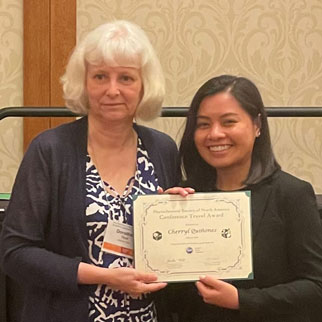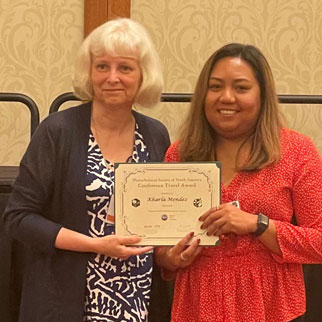Molecular Biosciences Ph.D. Students Win Research Awards
 |
 |
Cherryl Quiñones (left photo) and Kharla Mendez (right) receive their awards from Dr. Dorothea Tholl, president of the Phytochemical Society of North America during the PSNA conference in Blacksburg, Va.
JONESBORO – Two doctoral students in the molecular biosciences Ph.D. program at Arkansas State University recently received awards in recognition of their research related to the effects of high nighttime temperatures on the growth of rice.
Cherryl Quiñones won a conference fellowship and a best oral presentation award, and Kharla Mendez won a conference travel award, both from the Phytochemical Society of North America (PSNA).
Quiñones is mentored by Dr. Argelia Lorence, who is professor of metabolic engineering and James and Wanda Lee Vaughn Endowed Professor at A-State. Mendez is mentored by Lorence and Dr. Arlene Adviento-Borbe of the U.S. Department of Agriculture’s Agricultural Research Service Delta Water Management Unit.
The two presented their work, which they carry out at the Arkansas Biosciences Institute at A-State, at the PSNA international conference in Blacksburg, Va.
Quiñones’ presentation was titled “Assessing the Role of Ascorbate of a Rice Diversity Panel to High Night Temperature Stress Tolerance.” Based on a peer review, she won the award for best short presentation.
Co-authors of this work include Mendez, Shannon Cunningham, Wency Larazo, Shea Harris, Zachary Campbell, Dr. Karina Medina-Jimenez, Hannah Seats, Abigail Wilkie, Matthew Luster, and Dr. Harkamal Walia, along with Adviento-Borbe and Lorence.
Mendez presented both a poster and a flash talk titled “Carbohydrate Reserve: A Promising Phenotypic Marker for High Night Temperature Stress Tolerance in Rice.”
Her co-authors are Quiñones, Cunningham, Larazo, Harris, Campbell, Medina-Jimenez, Walia, Lorence and Adviento-Borbe.
Quiñones and Mendez. both natives of the Philippines, are part of Lorence’s research team whose work regarding heat on rice production was featured recently in the Guardian.





